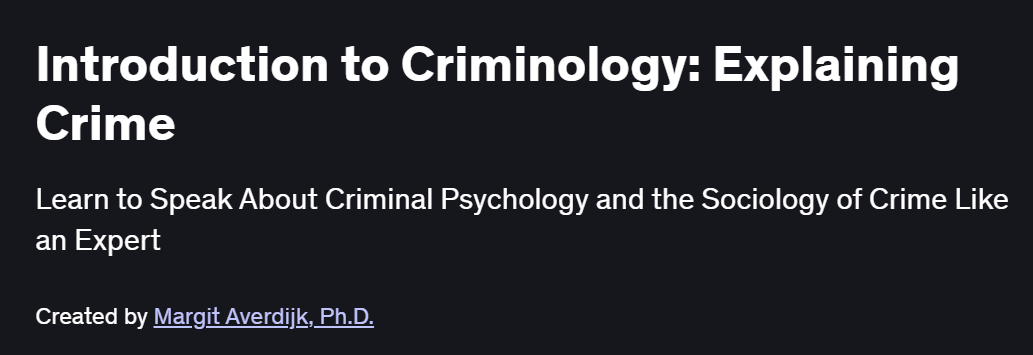What will you in Introduction to Criminology: Explaining Crime Course
Understand the foundations of criminology and its role in criminal justice
Explore major criminological theories: biological, psychological, and sociological
Analyze the mindset of offenders through criminal psychology frameworks
Identify types of crimes, offenders, and criminal behavior patterns
Apply criminological thinking to real-world case studies and forensic contexts
Program Overview
Module 1: Introduction to Criminology
⏳ 30 minutes
Definition, history, and scope of criminology
Criminology vs. criminal justice vs. forensic psychology
Module 2: Biological & Psychological Theories
⏳ 45 minutes
Early biological determinism and modern neurocriminology
Psychological traits, personality disorders, and psychopathy in offenders
Module 3: Sociological Theories of Crime
⏳ 1 hour
Social learning, strain theory, and labeling theory
Role of environment, peer groups, and socioeconomic status
Module 4: Criminal Psychology & Behavioral Patterns
⏳ 1 hour
Cognitive distortions, impulsivity, and decision-making in criminal acts
Profiling different offender types: serial offenders, white-collar criminals, etc.
Module 5: Types of Crimes & Offenders
⏳ 45 minutes
Violent vs. non-violent crime, organized crime, cybercrime
Juvenile delinquency, female offenders, and recidivism factors
Module 6: Case Studies & Applications
⏳ 45 minutes
Real-world analysis of notable criminal cases
Application of theories to investigative and correctional settings
Get certificate
Job Outlook
Criminology knowledge supports careers in law enforcement, corrections, forensic psychology, and social work
Useful for roles in criminal profiling, victim support, probation services, and legal research
Provides a strong foundation for further study in criminology, psychology, or criminal law
Helps professionals understand offender behavior and crime prevention strategies
Specification: Introduction to Criminology: Explaining Crime
|
FAQs
- No prior experience required; suitable for beginners.
- Covers history, scope, and core principles of criminology.
- Differentiates criminology, criminal justice, and forensic psychology.
- Explains the role of psychology in understanding criminal behavior.
- Builds a foundation for further study or professional application.
- Learn about violent vs. non-violent crimes and their patterns.
- Covers organized crime, cybercrime, and white-collar offenses.
- Explains juvenile delinquency, female offenders, and recidivism factors.
- Introduces offender profiling techniques and behavioral analysis.
- Enhances understanding of criminal patterns for real-world application.
- Explains psychological traits and personality disorders in offenders.
- Covers cognitive biases, impulsivity, and decision-making processes.
- Analyzes serial offenders, white-collar criminals, and other profiles.
- Introduces frameworks for interpreting criminal motives.
- Encourages application of theory to real-world case studies.
- Access via desktop, laptop, or mobile device with internet.
- Optional notebooks or digital tools for notes and case analysis.
- Includes structured video lectures and real-world examples.
- Lifetime access allows flexible self-paced study.
- No additional software or textbooks required.
- Prepares for careers in law enforcement, corrections, and forensic psychology.
- Supports roles in victim support, probation, and legal research.
- Provides understanding of offender behavior and crime prevention strategies.
- Builds a strong foundation for advanced criminology or criminal law studies.
- Enhances professional awareness and analytical skills for practical application.





